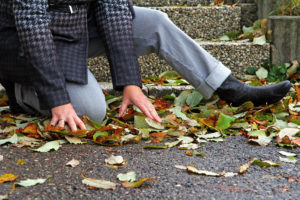 Slip and fall accidents can take place practically anywhere – on an uneven sidewalk, a wet surface in a store, or a broken staircase in a commercial building. Injuries stemming from these accidents can result in lasting effects, depending on their severity. When it comes to a slip and fall accident on a public sidewalk, it can be difficult to determine who is liable for your injuries.
Slip and fall accidents can take place practically anywhere – on an uneven sidewalk, a wet surface in a store, or a broken staircase in a commercial building. Injuries stemming from these accidents can result in lasting effects, depending on their severity. When it comes to a slip and fall accident on a public sidewalk, it can be difficult to determine who is liable for your injuries.
According to the Illinois Premises Liability Act, you can file a claim to get compensation when you sustain damages due to negligence of another person or entity responsible for the maintenance of the sidewalk. However, depending on the specific circumstances of your accident, you may face some obstacles in effectively recovering for your damages.
When a person is injured on a property, the Premises Liability Act enables them to hold the property owner liable for the injury. The basic idea is that the owner should maintain the premises in a way that is responsible. If a person enters the property, the owner owes a duty of care to that person to have no potential hazards that might result in an injury.
The law dictates that if the occupier or owner knows the hazard exists, they should either warn people about it or fix it in a timely manner. In case they are unable to do that, they will be considered negligent and may be liable to pay compensation for your damages. However, merely showing that you slipped and hurt yourself on the public sidewalk will not prove that the property owner or municipality authority was negligent. In order to establish negligence, you need to prove two things:
In Illinois, generally, municipalities and cities are responsible for maintaining public sidewalks, and hence can be held liable for injuries resulting from a slip and fall accident. However, there are several special rules and laws that protect municipalities from personal injury claims and lawsuits, such as the Local Government and Governmental Employees Tort Immunity Act. In some neighborhoods, homeowners and residential building owners are also responsible for the upkeep of sidewalks.
Depending on the specific circumstances of your case, you may file a claim against a municipality, but you need to work with an attorney who has experience in dealing with state-level claims. In Illinois, the statute of limitations for civil actions against a government entity is 2 years, which means that you will have to work fast in order to start your case. Moreover, unlike a regular personal injury claim, you will have to file a “notice of claim” with the Attorney General and the Clerk of the Court of Claims. This must be done within one year of the incident.

If you have been injured on a sidewalk in a slip and fall incident, you should file a personal injury claim to recover damages. It may be difficult for you to determine who is liable or whether you have a case, but an experienced Lake County slip and fall attorney can provide you with skilled legal counsel for your specific situation. Contact the Law Offices of Robert T. Edens, P.C. at (847) 395-2200 or online today to schedule your initial consultation.